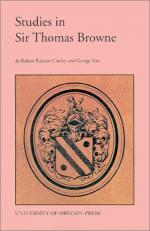|
This section contains 337 words (approx. 2 pages at 300 words per page) |
BROWNE, ROBERT (c. 1550–1633), leading Protestant Separatist from the Church of England in the reign of Elizabeth I. Although he finally conformed, his teaching anticipated much in later Independency, or Congregationalism. He was born at Tolesthorpe in Rutlandshire. For about twenty years after leaving Cambridge, he was an active Separatist. On receiving the bishop's license to preach in 1579, he threw it in the fire, asserting that he preached "not as caring for or leaning on the Bishop's authority, but only to satisfy his duty and conscience." He helped gather a dissenting congregation in Norwich in 1518 and was frequently imprisoned. In 1582 he was in exile in Holland.
During exile, he wrote the tracts that later became influential among more radical Protestants in which he insisted on the voluntary nature of church membership. The best-known is A treatise of Reformation without Tarying for Anie (1582). A Booke which Sheweth the life and Manner of All true Christians (1582) is the first outline of an Independent church polity.
Browne was a contentious individualist who frequently had to be rescued from trouble by his kinsman Lord Burghley. He fell out with his fellow Separatists Henry Barrow and John Greenwood over the eldership. In 1586, he became master of Saint Olave's School in Southwark but continued to minister to dissenting congregations. In 1591, however, Burghley presented him with the living of a church in Northamptonshire, where he remained for the rest of his life. He appears to have continued to be contentious even in conformity, because he died in Northampton jail after assaulting a constable.
Browne is best thought of as a precursor rather than a founding father of the later Congregational churches. The word Brownists became a general term of abuse for English Protestants who favored a democratic church polity.
Bibliography
Little book-length literature is available other than an edition of Browne's writings in Albert Peel and Leland H. Carlson's The Writings of Robert Harrison and Robert Browne (London, 1953). See also Champlin Burrage's The True Story of Robert Browne, 1550?–1633, Father of Congregationalism (Oxford, 1906).
|
This section contains 337 words (approx. 2 pages at 300 words per page) |


